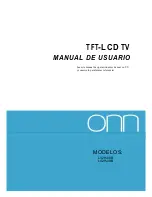
KDL-32BX355/40BX455/46BX455 5
SECTION 1 - FEATURES AND OVERVIEW
CPU:
The CPU internal to the MT5366 processor controls all aspects of
the television functions. Input from the user along with monitoring of critical
circuits is also performed by this CPU.
LVDS Transmitter:
Integrated into the MT5366 is a Low Voltage Differential
Signaling (LVDS) transmitter. This circuit converts the 8-bit parallel RGB
video information into a set of high speed serial lines for noise-free
transmission to the TCON circuits located internally to the LCD panel.
POWER SUPPLY BOARD
The Power Supply Boards used in these models are the:
●
G for all models
There are 2 distinct sections on the power supply:
Standby Supply:
Continuously operational as long as AC power is applied,
the standby supply generates 3.3VDC for the circuits requiring power while
the unit is turned off. An unregulated 15-volt line is present to provide power
to the main relay, PFC and main power supply at turn-on.
Main Supply:
Once the power supply receives a power-on command from
the CPU on the A board, the main switching supply is turned on to provide
a regulated 12V source, a dedicated un-regulated 15V for the audio circuits
and an unregulated 24V source for the inverter circuit.
IR BOARD
Designated as the H Board, the IR Board contains the power, standby, and
timer LED’s that is located on this board along with the IR remote receiver
and light level sensor.
SWITCH UNIT
This board contains the power, channel and volume up/down, and menu
buttons.
OVERALL CIRCUIT DESCRIPTION
“Overall Block Diagram” on page
11
provides an overview of the AZ3TK
chassis. The following are descriptions of the boards and their functions.
MAIN BOARD
Common to all models utilizing the AZ3TK chassis, the Main Board contains
most of the video processing circuitry along with all audio processing.
Control of the television is accomplished via a CPU embedded within the
MT5366 processor. Below is a list of the key components located on the
Main Board.
TUNER
The tuner is a combination ATSC/NTSC unit. It can receive traditional
analog NTSC signals via cable or terrestrial along with ATSC digital signals
via terrestrial (8VSB) or cable (64 or 256 QAM).
MT5366 PROCESSOR
This IC performs the majority of the necessary audio and video processing
on the Main Board.
Analog Video Input Switch:
All analog video sources are selected and
A/D converted and scaled (if necessary) to 1920 X 1080p 60HZ resolution.
Digital Audio and Video Decoder:
The MPEG2 and Digital Dolby audio
streams are received from the tuner for decompression. All video sources
which are not native 1920 X 1080p 60HZ are scaled to this resolution.
Digital audio content is output to the class D amplifier for processing and
amplification.
Audio Processing:
Analog audio sources are selected and A/D converted
directly by the MT5389. The audio information is then processed digitally.
Digital audio from the tuner and HDMI sources is also input and processed.
Class D amplifier provides the drive for the speakers.
HDMI Input and Switching:
The customer can select the HDMI1 through
HDMI4 input. Each HDMI input contains a dedicated EDI NVM (not shown)
to provide display information data to any device connected via the HDMI
inputs.














































